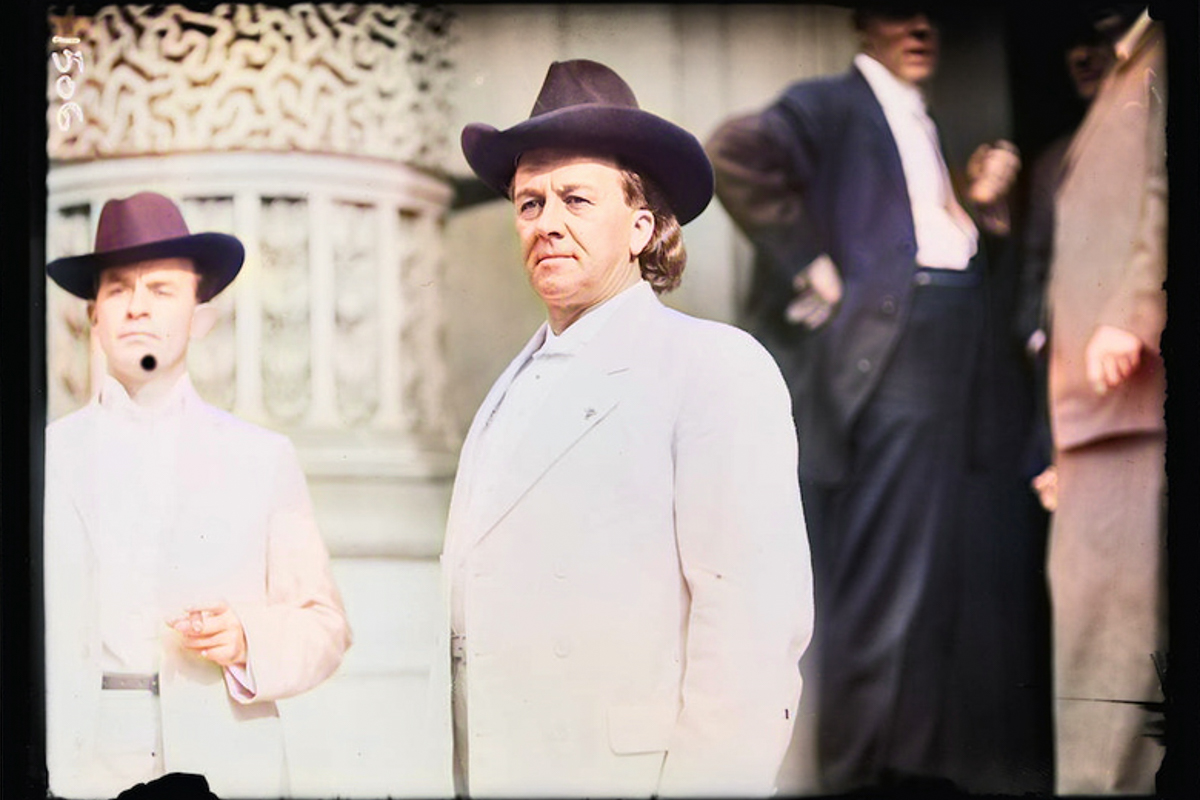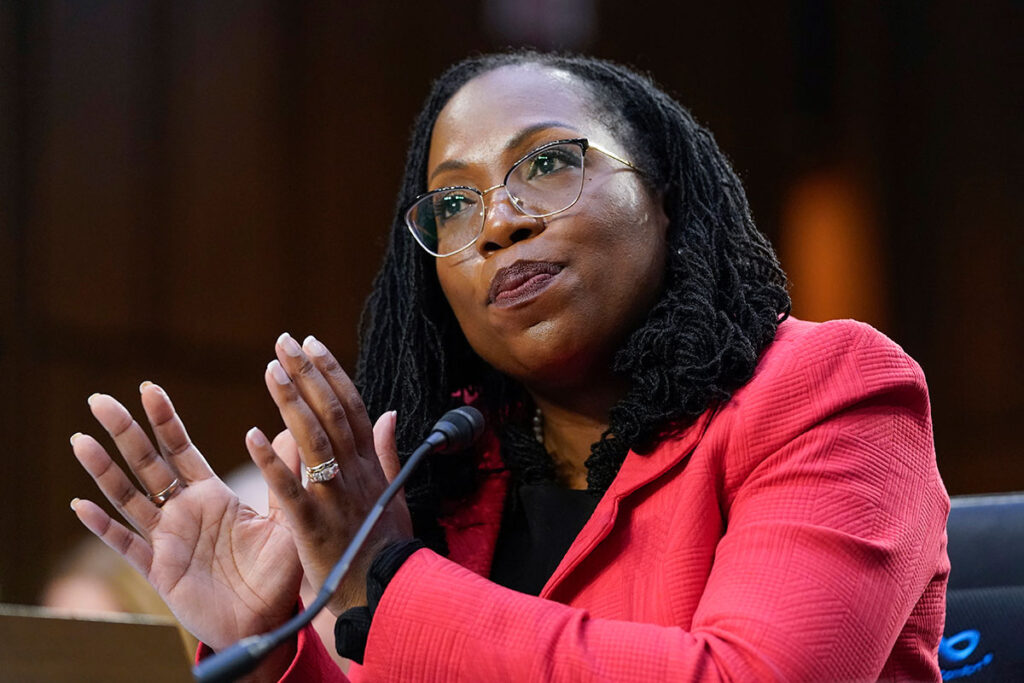Mississippi’s Jim Crow-era prohibitions on allowing people convicted of certain crimes to vote will remain after the U.S. Supreme Court declined to hear an appeal in the case today.
The 5th U.S. Circuit Court of Appeals ruled in favor of upholding the law last year in Harness v. Watson. Mississippi’s white supremacist leaders adopted it in 1890 in an attempt to disenfranchise Black residents for life. White lawmakers designated certain crimes that they believed Black people were more likely to commit as lifelong disenfranchising crimes. The law still disproportionately disenfranchises Black Mississippians at higher rates than white residents.
U.S. Supreme Court Justice Ketanji Brown Jackson recounted the law’s history today in a dissent against the court’s refusal to take the case. Justice Sonia Sotomayor joined her.
“The President of the 1890 Mississippi Constitutional Convention said it plain: ‘Let us tell the truth if it bursts to the bottom of the Universe … We came here to exclude the negro. Nothing short of this will answer.’ To further that agenda, the Convention placed nine crimes in §241 of the State’s Constitution as bases for disenfranchisement, believing that more Black people would be convicted of those crimes than White people,” Jackson wrote. “… Eight of those crimes have remained in §241 since 1890, without interruption. Thus, the Convention’s avowed goals continued to be realized via its chosen mechanism: Today (just as in the Convention’s aftermath), thousands of Black Mississippians cannot vote due to §241’s operation.”
During the Reconstruction era, newly emancipated Black Mississippians made enormous gains as Black men gained the right to vote. But in 1890, white Mississippi lawmakers began drafting a new constitution riddled with Jim Crow laws. The new system instituted an explicitly white-supremacist regime, with its drafters bent on disenfranchising, criminalizing and denying opportunity to the state’s Black residents.
The legislative committee that drafted Mississippi’s 1890 Constitution was initially explicit in its white-supremacist goals. They adopted a resolution declaring that “it is the duty of this Com. to perform its work in such a manner as to secure permanent white rule in all departments of state government and without due violence to the true principles of our republican system of government.”
They later revised the resolution, changing “white rule” to “intelligent rule.” Contrary to popular misconception, Jim Crow laws usually masqueraded as colorblind. But on the floor of the Mississippi Constitutional Convention, lawmakers were open about their intent.
After the state adopted that law as part of its constitution, along with other provisions like poll taxes and literacy tests, James K. Vardaman, one of its drafters, explained the goal: “There is no use to equivocate or lie about the matter … Mississippi’s constitutional convention of 1890 was held for no other purpose than to eliminate the n–ger from politics. Not the ‘ignorant and vicious’, as some of the apologists would have you believe, but the n–ger.” Supporters hailed Vardaman, who served as a Mississippi governor and U.S. senator, as the state’s “Great White Chief.”

Section 241 of the Mississippi Constitution originally permanently disenfranchised people who committed the following crimes: bribery, burglary theft, arson, obtaining money or goods under false pretense, perjury, forgery, embezzlement and bigamy. In their effort to only include crimes they believed Black people were most likely to commit, the white-supremacist drafters of the 1890 Constitution did not originally include murder and rape as disenfranchising crimes.
The State amended the Constitution in 1950, removing burglary as a disenfranchising crime. Later, in 1968, the 5th Circuit’s opinion says, the State made additional changes by voter referendum, including by adding “the ‘non-black’ crimes of ‘murder’ and ‘rape’ to the disenfranchising crimes in Section 241.”
“If Section 241 had never been amended, the provision would violate the Equal Protection Clause,” the U.S. 5th Circuit Court of Appeals’ majority said in its ruling last year. “… Critically, however, it has been amended.”
But in the period when Mississippi made changes to Section 241, the state’s white leaders and white residents were engaged in an often violent and deadly campaign of mass resistance to federal civil rights laws and protections. Even in 1968, long after the Brown v. Board ruling, Mississippi still maintained segregated public schools until the U.S. Supreme Court issued a final order to desegregate in 1969.
“To be sure, later amendments changed bases for disenfranchisement other than the eight at issue here: In 1950, burglary was removed from the list of disenfranchising crimes via the State’s amendment processes, and, in 1968, murder and rape were added via the same processes,” Jackson wrote in her dissent today. “… But, for federal constitutional purposes, the State never enacted any ‘new’ version of the original eight grounds for disenfranchisement. In 1950, voters could have either removed burglary from §241 or left §241 unchanged. So, too, in 1968—voters could have added murder and rape or left §241 unchanged. Id., at 319, 323–324 (Graves, J., dissenting). No other change to the original list of crimes was ever on offer. Therefore, the same discriminatory list of crimes that the 1890 Constitution’s ratifiers ‘ma[d]e into law by authoritative act’ operates to disenfranchise Mississippians who commit those crimes today.”
The Mississippi Center For Justice, which first filed the lawsuit on behalf of disenfranchised residents Roy Harness and Kamal Karriem six years ago, decried the U.S. Supreme Court’s decision to allow the 133-year-old law to stand and called for legislative action.
“We are extremely disappointed in the Supreme Court’s failure to review the case and eliminate this post-Reconstruction vestige of white supremacy from Mississippi’s constitution and Mississippi’s elections,” said MCJ attorney Rob McDuff. “Now that the federal courts have declined to step it, the Mississippi legislature must step up and launch the process of amending the state constitution to repeal it.”
Jackson, who became the first Black woman on the U.S. Supreme Court when President Joe Biden appointed her last year, pointed out that the nation’s high court previously considered Section 241 of the Mississippi Constitution in 1898. In that case, Williams v. Mississippi, the court’s majority determined at the time that Mississippi’s Jim Crow laws were not racially discriminatory because they only made it possible for officials to discriminate on the basis of race, but did not specify racial discrimination as its goal. In response, other southern states followed Mississippi’s lead with their own Jim Crow constitutions. In addition to the felony disenfranchisement law, the decision allowed other racist tactics like poll taxes and literacy tests to stand.
The ruling came a day after Chief Justice John Roberts delivered an opinion for the majority ruling that using affirmative action for race-conscious college admissions is unconstitutional. In that ruling, Jackson noted in today’s dissent, the court declared that the “‘Constitution deals with substance, not shadows,’ and the [constitutional] prohibition against racial discrimination is ‘leveled at the thing, not the name.’”
“There are no shadows in §241, only the most toxic of substances,” she wrote. “Thus, the majority’s decision not to take up this matter is doubly unfortunate. We were asked to address this problem 125 years ago in Williams and declined. todo so. … And this court blinks again today. So, at the same time that the Court undertakes to slay other giants, Mississippians can only hope that they will not have to wait another century for a judicial knight-errant. Constitutional wrongs do not right themselves. With its failure to take action, the Court has missed yet another opportunity to learn from its mistakes.”
None of the justices who opposed hearing the case commented on their decision.










